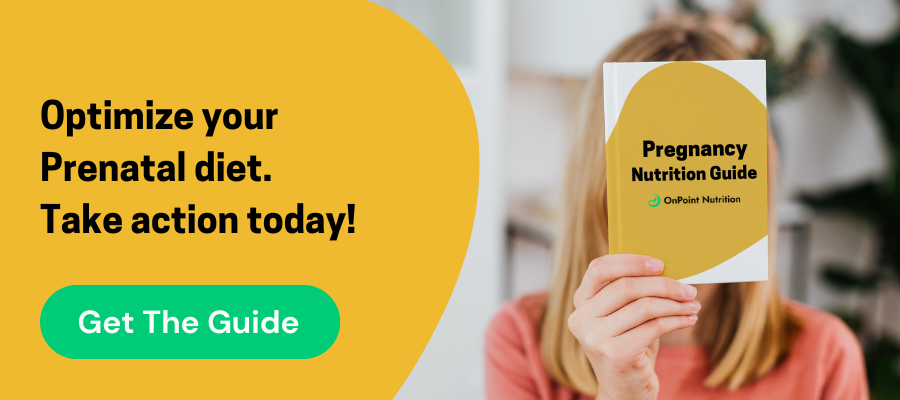
Folate is the natural form of B9 and is part of the B vitamin group. Folate is a water-soluble vitamin found in many foods. It is also added to foods and sold as a supplement in the form of folic acid. Folic acid is more readily absorbed than folate found in food sources. 85% of folic acid added into foods or found in supplements is absorbed, compared to 50% of folate found naturally in foods.
Folate is an important nutrient that helps form DNA and RNA. It is involved in protein metabolism and plays a key role in breaking down an amino acid called homocysteine, which can have harmful effects if it is present in high amounts in your body. Your body also uses Folate to produce red blood cells and is critical during periods of rapid growth (pregnancy and fetal development).
Folate is one of the most important vitamins during pregnancy. Low folate intake has been linked to neural tube defects such as spina bifida and brain anencephaly. You should take at least 400mcg of folate during the first few weeks of pregnancy; immediately after conception is when the fetus is starting to develop major organs such as spine and brain.
Folate Food Sources
Remember that there is a difference between the folate found naturally in foods and the folic acid that is fortified into grocery foods and supplements. Include both in your diet to best prevent issues caused by too little folate during your pregnancy.
Folic Acid Vegetables
Foods that naturally contain folate include:
- Dark green leafy vegetables, including spinach, kale, brussels sprouts, broccoli, and asparagus
- ½ cup of asparagus contains 134mcg of folate
- One cup of spinach provides about 58mcg of folate
- Beets contain 148mcg for a single cup
- Brussels sprouts also have a good amount of micronutrients and antioxidants along with folate, containing 47mcg for ½ cup
- Broccoli contains 57mcg per 1 cup. When cooked, broccoli contains even more folate, providing 84mcg per half a cup.
Folic Acid Beans and Legumes
Beans, legumes, peas, and lentils all contain adequate amounts of folate. 1 cup of kidney beans contains about 131mcg of folate, while 1 cup of legumes contains 258mcg of folate, which is 90% of the daily recommended value. Beans and legumes are also great sources of fiber, complex carbohydrates, and protein!
Folic Acid Fruits
Fresh citrus fruits are also high in folate. Oranges contain 55mcg of folate. Papaya is another fruit that is nutrient-dense, containing 53mcg of folate along with high levels of vitamin C, potassium, and carotenoids. Bananas are also high in folate, containing 23.6mcg. Avocados are another popular fruit that is high in folate. One half banana has 82mcg of folate. Bananas are also high in monounsaturated fats that help to increase “good” HDL cholesterol while decreasing “bad” LDL cholesterol.
Folic Acid and Other Foods
Beef liver is one of the most concentrated sources of folate. A 3oz serving of liver contains 212mcg of folate as well as having high levels of vitamin A, B12, copper and 24g of protein.
Nuts and seeds also contain traces of folate. One ounce of almonds and flaxseeds provides about 28mcg of folate. Along with nuts and seeds, whole grains such as wheat germ contain 78.7mcg of folate as well as a good amount of fiber and antioxidants.
Eggs are another great source of essential vitamins. Eggs contain protein, selenium, riboflavin, B12 and folate. One large egg contains about 22mcg of folate.
Fortified Sources of Folic Acid
Because folic acid is readily absorbed by your body, many food companies add it to everyday items. Fortified grains such as breads, cereals, pasta, and rice have been fortified to boost the amount of folic acid in them. Studies have also suggested that folic acid fortified in foods is more easily absorbed in the body. One cup of cooked pasta contains about 26% of the daily value of folic acid.
Folic acid supplements are also prescribed as part of prenatal vitamins for moms-to-be to make sure they are getting enough folate during the critical stages of early pregnancy.
To Summarize
Moms-to be-to must eat a plentiful balance of folate-containing foods and folic acid-fortified foods during early pregnancy. In addition to prenatal vitamins, the folate found in dark green leafy veggies, citrus fruits, nuts, seeds, and whole grains increases your total folate intake. Fortified foods such as grains aid in folic acid absorption and increase overall folate consumption. Not only do these foods provide the necessary nutrient folate, but they also provide other important nutrients such as vitamin A, Vitamin C, Vitamin B12, fiber, and protein.

Topics

Liz has been reading nutrition labels since she learned how to read. Growing up with severe peanut and tree nut allergies she learned that it’s important to know what you are putting into your body. She made her first big lifestyle change as a freshman in high school, when she decided to become a vegetarian. However, it wasn’t until she took a food class in Italy as part of a study abroad program in college that it clicked in her mind that she wanted to make food and nutrition her career. Liz graduated from Penn State University in 2015 with a bachelor's degree in Nutrition, as well as a bachelor's degree in Marketing. She completed her dietetic internship with Aramark in Philadelphia, and her master's degree at Northeastern University shortly after.




